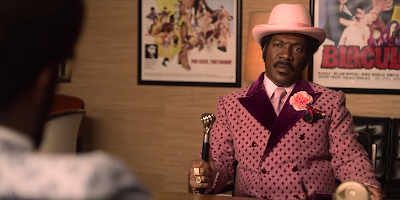Director: Martin Scorsese.
Cast: Robert De Niro, Al Pacino, Joe Pesci, Ray Romano, Bobby Cannavale, Anna Paquin, Lucy Gallina, Stephen Graham, Harvey Keitel, Stephanie Kurtzuba, Kathrine Narducci, Welker White, Jesse Plemons, Louis Cancelmi.
 |
| "And then I said, 'Rocky and Buckwinkle? Fuck yeah I'm in'." |
For Scorsese, this was an opportunity to realise his and De Niro's long-held dream of adapting Charles Brandt's biography of mob hitman Frank Sheeran. The film had sat in various levels of development hell for over a decade, but Netflix were willing to throw a remarkable US$170m+ at the project - the biggest budget drama in a long time.
Will it be worth it for Netflix? In money terms, it remains to be seen, but in artistic terms, it's money well spent. The Irishman is familiar territory for Scorsese, harking back to his sweeping mobster epics Goodfellas and Casino. It's just as compelling as those two classics, if a bit slower and more languid in its approach.
Sheeran (played across many decades by a CG de-aged De Niro) is a WWII veteran and meat truck driver who finds himself doing favours for the mob in Philadelphia. Soon he's their go-to hitman, as well as be a good friend and confidante for union boss Jimmy Hoffa (Pacino). He suddenly finds himself as a key player in some big moments in history, like Forrest Gump with a revolver.
There are a lot of reasons to recommend this film, but the main ones can be summarised in surnames - Scorsese. De Niro. Pacino. Pesci. This quadruple threat works wonders, wringing every ounce of drama and quiet menace from the material.
Scorsese is remarkably consistent director, even when he's trying new things. With The Irishman, it feels a little like just another day at the office for the legendary director, but the passion is evident. It's like when a band goes "back to basics" and pulls it off. This is familiar territory, but he's not being lazy about it. His trademarks are present - the bravura long takes, the veritas he brings to mob life, the cool soundtrack, the offbeat hints of humour - but he's finding new tricks for telling old stories with his use of the de-ageing CG, which looks incredible as often as it visits uncanny valley.
For his top-billed stars though, this is a return to form. De Niro has been good in great films on occasion over the past decade (Silver Linings Playbook, American Hustle, Joker) but here he's on song like he hasn't been in since the '90s. Likewise for Pacino, who gets to chew scenery as per usual but also dials things down when he needs to.
But both are outmatched by Pesci as mob boss Russell Buffalino. In only his second major onscreen role in over 20 years, Pesci shows he's lost nothing in retirement. His is the quieter of the three main roles, but it demonstrates a rarely seen side of Pesci - one of understatement. There are no fiery bursts of anger that one might expect from Pesci in a Scorsese film - this is subdued command and confidence. It's about the way he leans on words and phrases, the weight he puts into a look. It's a great turn, one of his best.
All three get a lot out of the material, with the screenplay from Steven Zaillian giving them great lines and scenes. His script also lets the story breathe, and while clocking in at three and a half hours might be pushing the friendship, almost every part of the film, in hindsight, feels necessary. As slow and as sprawling as it can be, there's no point where you feel like you want to switch off, and across its last hour and a half, it's unmissable.
Its length, pace and sprawl are little off-putting, and stacked up against its older brothers of Goodfellas and Casino, it's less definitive, less vital. But The Irishman shows us many things - it shows that on their day, De Niro, Pacino and Pesci have still got it. And as for Scorsese... well, he never lost it.



